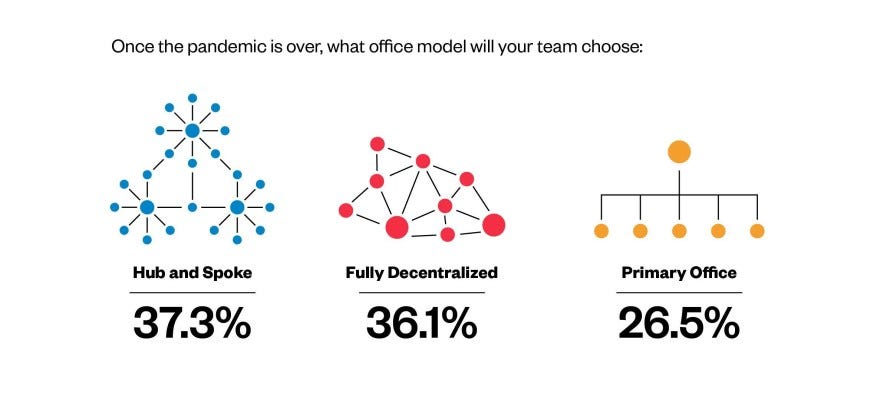Make Work Better is a weekly newsletter about creating better workplace culture. If you’re new round here, welcome, a couple of weeks ago I shared culture survival advice from lots of other firms.
Way Ahead of Amara’s Law?
It’s often mentioned that most of the transformation we have thus far witnessed to the retail market was set in place when less than 15% of transactions shifted from bricks and mortar stores to online. It wasn’t so long ago that companies felt they had a choice whether to participate in the dotcom disruption or just to stick to their knitting and let their traditional business remain in good health. I vividly recall watching a well known UK furniture business assert that their customers weren’t online and had no plans to be. Why should they be? Furniture? Online? As if!
A decade ago I sat in the audience for a triumphant keynote by the supremo of a resurgent High Street retailer. The department store boss calmly explained how his turnaround strategy had ignored the internet, his success was based on an improved range of offerings to his fiercely loyal IRL customers. Both the furniture chain and the retail store (Debenhams) have now gone from our city centres. All of this disruption is after a small slice of retail moved. And while of course lockdown has had significant uplift on this share (for the UK it’s reached over 30% at times in the last year) the current equilibrium levels are in excess of 20% and trending upwards.
No doubt the next decade will see even more disruption, it’s a form of narrative fallacy that we see ourselves at the end of a story rather than just at the beginning of it.
Where are we on the transformation of work? The old adage of Amara’s Law is that we tend to overestimate the effect of a technology in the short run and underestimate the effect in the long run. Based on a reasonable interpretation of Amara’s Law we might presume that our organisations might comfortably adopt a day or two a week of remote working when we return to the office, but there will be plenty of time before we see something more radical.
There’s a piece of research that was published last week that makes me wonder if we’re way off the mark when it comes to remote working. The disruption is going to be bigger, and faster than any of us are braced for.
First a caveat, this was research conducted by Initialized, a Silicon Valley based VC fund (to get on at Initialized, make sure you do the 🤔 emoji in your corporate photo). Firms in that cohort are technologically, geographically and demographically unrepresentative of the wider job market. However the way they’ve been working in the last twelve months has a lot in common with the way that the half of us who can work remotely have been working. Zoom calls, Teams or Slack chats, shared Google Docs - take your pick of the platform, it’s broadly the same behaviours.
But the second qualification to the research is that the San Franciscan Bay Area has been fetishised by the start-up community. Location, location, location is everything to these firms. There’s been a collective belief that ‘the only place we can hire All The Good People’ is by pitching our tent in the 30 mile radius area that runs from San Francisco to San Jose, taking in the likes of Palo Alto and Cupertino on the way.
Firms in the Initialized survey are asked ‘once the pandemic is over, what office model will your team choose?’ One-third of companies said they expected little or no office usage post-pandemic. Around a quarter say they will focus on one primary office. 40% of founders say if they were starting today they would start ‘in the cloud’ (i.e fully remote).
Even accepting that these firms aren’t representative the choices are facing do seem to be consistent with what we are seeing elsewhere. Two-thirds of these firms say they expect work will become a two or three day week in the office activity.
The reason why I’m inclined to believe that these things may develop more momentum than we might imagine is because the upsides of remote work seem to be coming from unexpected places. In the last month I’ve heard from three organisations who run major call centres who have said remote work has been astonishingly productive for call handling. With between 7 and 15% increase in productivity.
Call centres were knowledge work’s closest approximations to the factory. Units of knowledge work stripped down to simple, repeatable actions and produced at scale. The critical thing that call centres have that most jobs lack is measurement. The organisations that run call centres run metrics for days: customer satisfaction, productivity, net promoter scores, everything. If the operators of them are convinced that remote work is succeeding then they will double down on the cost saving that home-working represents.
Amara’s Law is that we tend to overestimate the short-term effect and underestimate the long term. Don’t be surprised if Amara gets it wrong this time.
Hopefully a few of you enjoyed my new Audible Original, No Office Required, last week. It’s free (for now) for Audible subscribers so if you’ve been tempted to listen to an audiobook on your daily walk you can get mine for free too.
In the meantime this week’s podcast is a conversation with Dr Damian Scarf about how feeling connected to others is the root of resilience. As he says in his TEDx Talk that put me on to him:
‘it’s our connections with those around us, the groups we belong to, that bolster our resilience. The number of groups we belong to not only bolsters our resilience, but is also protective against developing depression, can be curative of existing depression, and helps to prevent depression relapse. Even when you're old, groups are critical. The more groups we belong to, the slower our cognitive decline’.
I went on Steven Bartlett’s brilliant Diary of a CEO podcast. Yes, I should have worn a shirt, rather than look like I just stumbled out of bed, I only realised that it was going to be video when I got to Old Street Tube station.
A couple of weeks ago I wrote about how, if left unchecked a new form of office politics could start pervading some organisations. An article this weekend in the New York Times goes further describing how a culture of cameras off prickliness is starting to spawn in some firms. I’ve said many times that my experience of working for 12 years in YouTube and Twitter is that connecting people and forging communities of shared interest can be energising and elevating for those involved, but as soon as suspicion and distrust creeps into any screen-based discourse hostility can arise. The lesson of the internet is that unless people feel a shared sense of identity then issues can arise (this is touched on in this week’s podcast, above)
This is really good. It’s a year since Clayton Christensen the guru of disruptive innovation theory passed away. He tells a story here of how the boss of a major tech firm asked him to come in and do a talk to his leadership team. Originally asked to prep for a 30 minute talk but at the last moment the slot got slashed down to ten. Which ten minutes do you choose? The choice Christensen made helped his message land with the group of execs. (TL;DR He taught them the model, not the answer)
I was talking to someone about Cal Newport’s forthcoming book about email-free working and I mentioned his support of using Trello boards (other project management software is available). I found this article that explains why he believes it will be liberating for firms - it’s a good piece
A decade of AI ahead
A strange and slightly dystopian report from Citrix here. They think that the vast majority of workers think that technology and AI will be the driver of their firm by the end of the decade, and that by 2035 permanent employment will be rare.
The brilliant Zeynep Ton explaining how we need to look at workers’ actions not words. Zeynep is a retail specialist and there’s loads of extra goodness in this link if that’s your field (I interviewed her a while back and it’s a brilliant discussion)
Youths really can catch moods from each other (which, again, this week’s podcast covers)
I truly love articles like this New Yorker piece speculating about whether earth has already been visited by aliens
If you’re wondering if the whole workplace culture industry is a scam, designed to make us love something that should simply be a means to an end of earning money, then this article is for you. I don’t agree with most of it but it’s an interesting provocation.
Make Work Better is created by Bruce Daisley, workplace culture enthusiast. You can find more about Bruce’s book, podcast and writing at the Eat Sleep Work Repeat website. I’m speaking at The Economist’s workplace conference next week - it’s free to join. Photo by Daniel Eledut on Unsplash









